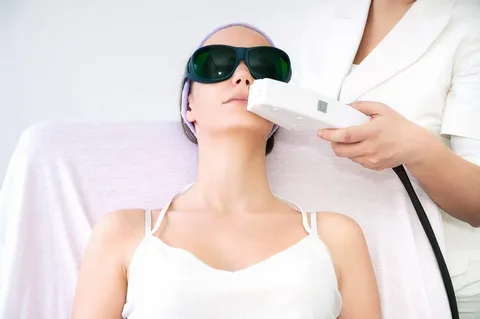Laser hair removal has evolved significantly over the past two decades. Initially recommended mainly for individuals with light skin and dark hair, today’s technology has become more inclusive, offering effective and safe solutions for a variety of skin tones. If you’re considering this treatment in Dubai, you may be wondering whether it’s safe for your specific skin type. The good news is: with the right equipment and qualified practitioners, laser hair removal can be a safe and successful solution for almost everyone.
Clinics offering laser hair removal in Dubai إزالة الشعر بالليزر في دبي are renowned for using cutting-edge technologies and tailoring treatments to diverse populations. Because Dubai is a cosmopolitan hub with residents and tourists from across the globe, professionals are well-versed in treating all skin tones and hair types.
In this article, we’ll explore the safety of laser hair removal for different skin types, the importance of selecting the right laser, and how to minimize risk.

Understanding Fitzpatrick Skin Types
The Fitzpatrick scale is commonly used to classify skin tones, ranging from Type I (very fair) to Type VI (very dark). Here’s a quick breakdown:
-
Type I: Very fair, always burns, never tans (e.g., Irish or Nordic heritage)
-
Type II: Fair, usually burns, tans minimally
-
Type III: Medium, sometimes burns, gradually tans
-
Type IV: Olive or light brown, rarely burns, tans easily
-
Type V: Brown, very rarely burns, tans well
-
Type VI: Dark brown to black, never burns
The risk of side effects like hyperpigmentation or burns increases with darker skin types if the wrong laser is used. Therefore, knowing your skin type helps practitioners determine the safest laser system for your treatment.
Which Lasers Are Best for Different Skin Types?
Different lasers are suited to different skin types:
1. Alexandrite Laser (755 nm)
-
Best for: Skin types I–III
-
Details: Highly effective on lighter skin with dark hair. Not recommended for darker tones due to increased risk of burns or pigmentation changes.
2. Diode Laser (810 nm)
-
Best for: Skin types I–IV
-
Details: Offers a good balance of safety and efficacy. Deeper penetration allows safe treatment on medium to darker skin, depending on device settings.
3. Nd:YAG Laser (1064 nm)
-
Best for: Skin types IV–VI
-
Details: The gold standard for darker skin. It targets the deeper part of the follicle without damaging surrounding pigment, making it ideal for rich or deep skin tones.
Modern clinics in Dubai often use multi-platform devices that include more than one type of laser, enabling customized treatment for each patient.
Safety for Darker Skin Tones
Historically, people with darker skin were at greater risk of side effects due to outdated or inappropriate laser technology. However, advances in the Nd:YAG laser and diode systems have changed this dramatically.
Key benefits of modern lasers for darker skin include:
-
Longer wavelengths: Bypass the melanin in the skin surface, targeting the follicle safely.
-
Pulse duration control: Adjusts how long energy is delivered, minimizing heat damage to surrounding tissue.
-
Cooling mechanisms: Protect the epidermis by keeping the skin cool during treatment.
That said, the skill and experience of the technician are just as important as the machine. Choose a clinic where the staff has direct experience working with all skin types.
What Are the Common Risks for Dark Skin Types?
If improperly treated, individuals with darker skin may face:
-
Hyperpigmentation (darkening of the skin)
-
Hypopigmentation (light patches)
-
Burns or blistering
-
Scarring (rare)
To reduce these risks:
-
Ensure a patch test is conducted before your full session.
-
Avoid sun exposure before and after the procedure.
-
Only choose a provider who has experience treating your skin tone.
Tips for Ensuring a Safe Experience
1. Choose a Licensed Clinic in Dubai
Not all clinics are created equal. Opt for centers that are DHA-certified and have board-certified dermatologists or laser technicians on staff.
2. Ask About the Equipment
Don’t hesitate to ask what type of laser the clinic uses. If you have darker skin, ask specifically whether they use the Nd:YAG or a Diode laser with appropriate settings.
3. Share Your Medical History
Conditions like eczema, recent tanning, or the use of certain medications (like Accutane) can affect how your skin responds to the laser. Be honest about your history to avoid complications.
4. Do a Test Patch
A test patch helps determine how your skin will respond to the laser. It’s a simple and essential step that responsible clinics never skip.
5. Follow Pre- and Post-Care Instructions
This includes avoiding sun exposure, not waxing or tweezing before sessions, and using soothing creams afterward.
Is Laser Hair Removal Permanent for All Skin Types?
Laser hair removal offers long-term hair reduction, not complete and permanent removal. Most patients enjoy 80–90% hair reduction after a full course of 6–8 sessions. Follow-up maintenance may be required every 6 to 12 months.
The success also depends on your hair texture, growth cycle, and hormonal factors. Thicker, darker hair responds best, regardless of skin tone.
Why Dubai Is a Great Choice for Laser Hair Removal
Dubai offers a unique combination of:
-
Advanced equipment in aesthetic clinics
-
Skilled professionals with international certifications
-
Cultural diversity, leading to wide experience treating all skin types
-
Strict safety protocols and hygiene
This makes it one of the safest and most effective places to undergo laser hair removal in Dubai for people of every skin tone and ethnicity.
Conclusion
Laser hair removal in Dubai is safe for all skin types—provided you choose the right laser, follow proper pre- and post-care instructions, and work with certified professionals. While people with darker skin tones must take a few extra precautions, advancements in technology have made this treatment both effective and safe.
If you’ve been hesitant due to concerns about skin tone, rest assured: modern clinics in Dubai can deliver great results tailored to your unique needs.







0 Comments